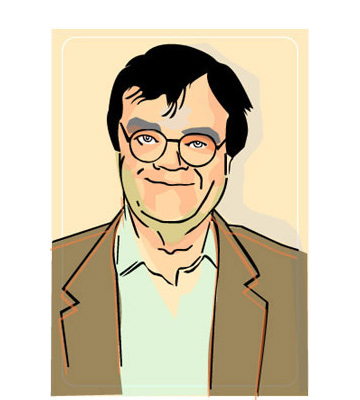Ten a.m. A phone call from my daughter’s school, and instantly the father’s mind goes to Dark Foreboding, but no — this is her teacher calling to say that the child scored 96 on the spelling test. The child’s instant reward is the phone call home and the words of praise. She sits at her desk pretending not to listen, basking in the acclaim. Well done.
Having begotten a good speller is no small matter to a writer. Writing is an act of paying attention, and if you don’t care about the difference between “their” and “there” or “needle” and “noodle,” then I am sorry for you.
The teacher’s praise of my child is a large moment in the day. I live with fear as any parent does. I know people who’ve gone through catastrophes — schizophrenia, the suicide of a child — the skin shrivels at the words, and so the life of a parent is one of constant wordless prayer. Today, my child scored 96 on spelling. A good day.
It has been a good winter with plentiful snow. The skiers are grateful, so are the men with snowblowers. The people who loathe winter are happy in their loathing and can practice the fine art of grumbling and grousing, and we who love a winter night can bundle up and walk the streets of St. Paul in the friendly lamplight past billows of snowdrifts and the houses concealing the lives of our neighbors, though of course we can speculate — this unscraped sidewalk, is it not a sign of alcoholism? And I think of John Updike, who illuminated private lives and wrote so lovingly of the world, who called snowfall “an immense whispering” and compared a brilliant snowy day to overdeveloped film. Who re-created the backyards and clotheslines of small-town 1940s Pennsylvania and described the way a girl walked in the hall of high school carrying her books against her body, and in a great story, “My Father’s Tears,” three years ago in the New Yorker, he gave us his father bidding him goodbye on a train platform. Nothing was beneath his careful attention.
I saw him a year ago in New York, and my wife and I rode the subway with him from 155th Street down to 72nd, and he grinned all the way, a white-haired gent of 75 in a tan raincoat, like a boy going away to school, and a little nervous. As it turns out, that was my very last chance to tell him, standing above him, the train swaying, that “The Centaur” and the Rabbit Angstrom books are permanent masterpieces and also his Olinger stories, and I didn’t tell him that. I opted to be cool. And then a gaggle of college kids boarded and crowded around him, not recognizing him, and in all that chatter and attitude, Updike sat soaking it all up. Material.
He was the great American man of letters of the second half of the 20th century, critic, poet, novelist, master of the short story, and a man of Lutheran virtues, cheerful, hardworking, self-deprecating, ever grateful for opportunity. He was a charming and generous interview though he claimed to dislike being interviewed. He was dark on the subject of celebrity — “Celebrity is a mask that eats into the face,” he wrote. “As soon as one is aware of being ‘somebody,’ to be watched and listened to with extra interest, input ceases, and the performer goes blind and deaf in his overanimation. One can either see or be seen” — but as a Famous American Writer, he was a champion, worthy to wear the belt.
He was the cheerfullest writer in the world. He mourned the loss of a wide readership — he loathed the term “literary fiction,” which seemed to quarantine serious writers like him (why not just call it “fiction you won’t enjoy”?) — but he was full of gratitude and appreciation. He was a great appreciator. And if John ever wrote you a note of appreciation for something you had written or done, it buoyed you up for weeks.
This is what the obituaries leave out. The giants fall and we leave them behind but who is left to bless us? Nobody. As long as John was in the world, you could imagine him calling up one morning and saying, “That was good. I liked that.” And now the phone is dead. I feel bereft.
(Garrison Keillor is the author of a new Lake Wobegon novel, “Liberty,” published by Viking.)
© 2009 by Garrison Keillor. All rights reserved. Distributed by Tribune Media Services, Inc.

